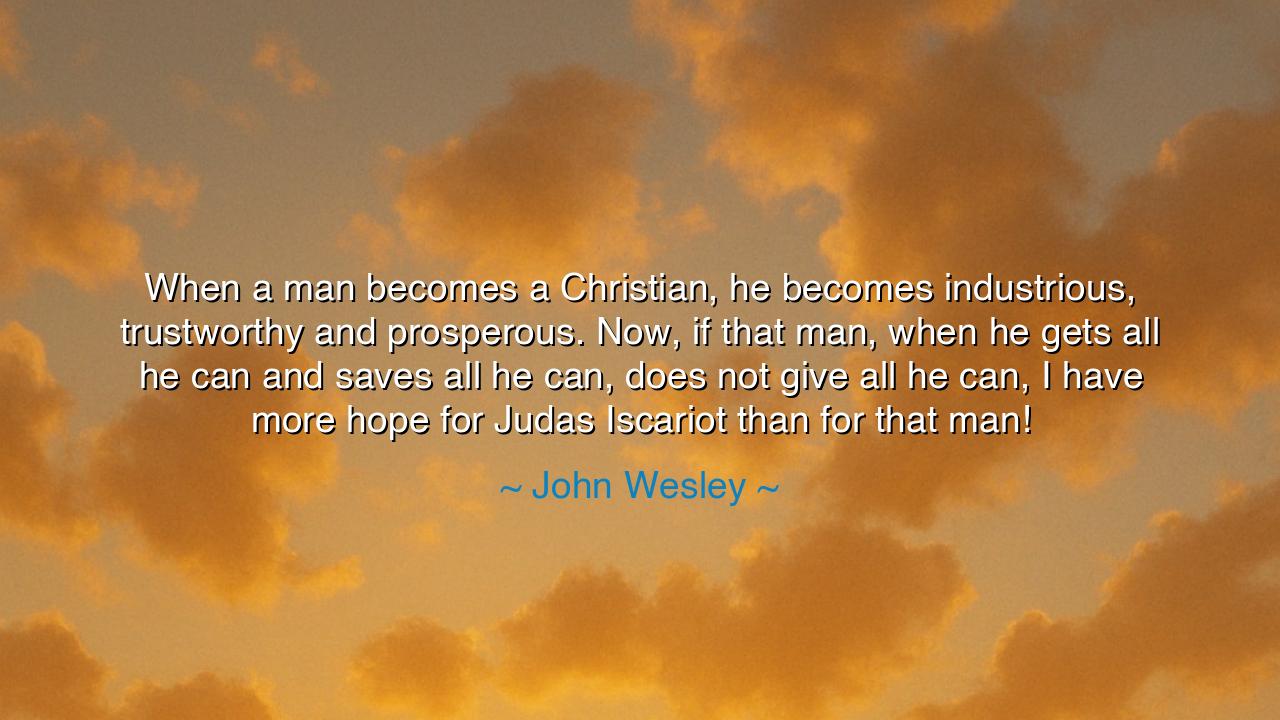
When a man becomes a Christian, he becomes industrious
When a man becomes a Christian, he becomes industrious, trustworthy and prosperous. Now, if that man, when he gets all he can and saves all he can, does not give all he can, I have more hope for Judas Iscariot than for that man!






Hearken, O children of virtue and devotion, and attend to the words of John Wesley, the venerable preacher and guide, who declared: “When a man becomes a Christian, he becomes industrious, trustworthy and prosperous. Now, if that man, when he gets all he can and saves all he can, does not give all he can, I have more hope for Judas Iscariot than for that man!” In this utterance lies a timeless truth: faith without generosity is hollow, and the measure of a soul is not in accumulation, but in the giving of all one possesses. Industry, trustworthiness, prosperity, and charity are the pillars of righteous living, and the neglect of the final, sacred duty—almsgiving—is a moral failing as grave as betrayal.
Since the dawn of human conscience, sages and prophets have taught that wealth, skill, and influence are but tools, not treasures in themselves. The Israelites learned from the words of Moses to care for the widow, the orphan, and the stranger; the early Christians followed Christ’s command to love and serve others. Wesley’s words echo this eternal principle: prosperity carries obligation, and Christian virtue manifests in the generosity that mirrors divine grace. A man who hoards, despite industriousness and trustworthiness, betrays the very principles that enabled his success.
Consider the story of Cornelius Vanderbilt, who amassed great wealth through shipping and railroads in the 19th century. Though industrious and prosperous, his legacy is often judged not merely by fortune, but by how he transformed wealth into institutions, philanthropy, and opportunity for others. Wesley’s admonition reminds us that accumulation without giving, without purpose beyond self, is morally deficient. Even the betrayer Judas, flawed though he was, might earn more hope if compared to a Christian who hoards and refuses to bless others with abundance.
The essence of this teaching lies in the fusion of faith and action. Christianity, in Wesley’s vision, is not passive or theoretical. It is a call to industrious labor, to earn honestly, to live in trust and integrity, and finally, to give abundantly. The spiritual path is incomplete if generosity does not accompany achievement, for wealth and skill are tests, and the true measure of the heart is revealed in how one distributes the fruits of one’s labor.
O seekers, reflect upon the parables of the New Testament. The talents entrusted to servants, the widow’s mite, the feeding of the multitudes—each illustrates the sacred interplay of industry, stewardship, and generosity. Wesley amplifies this lesson: a man who grows prosperous yet fails to give all he can violates the covenant of human solidarity and divine expectation. His life becomes a cautionary tale, a warning that trustworthiness and prosperity alone do not sanctify the soul.
Moreover, Wesley’s words teach that ethical life is active and intentional. To accumulate wealth or skill without channeling it toward good is to fall short of vocation. History is filled with examples of industrious individuals whose legacies were tarnished by selfishness, while others, like Andrew Carnegie, who gave vast sums to libraries, education, and social causes, became paragons of purposeful prosperity. Faith, labor, and generosity are inseparable; neglect one, and the edifice crumbles.
The lesson endures: labor diligently, cultivate honesty and trustworthiness, and pursue prosperity with integrity. But let the apex of achievement be generosity, giving all one can to uplift, sustain, and serve others. In doing so, one transforms prosperity from mere wealth into sacred stewardship, aligning human effort with divine intent. Without this final act, even the most industrious life falls short of virtue.
Thus, John Wesley’s words remain a clarion call through the ages: Christianity is measured not in toil or accumulation alone, but in the boundless giving of all one can. Let every skill, every resource, every blessing be shared freely, for in generosity lies the fulfillment of vocation, the demonstration of faith, and the hope of eternal grace. Walk this path, O seeker, and let your life shine as an example of labor, trust, prosperity, and the sacred act of giving.
If you wish, I can also craft a short illustrative story showing a person living industriously yet learning the power of giving, making Wesley’s warning vividly tangible for listeners. Would you like me to do that?






AAdministratorAdministrator
Welcome, honored guests. Please leave a comment, we will respond soon